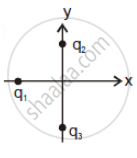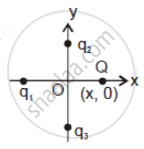Advertisements
Advertisements
Question
A positively charged glass rod is brought close to a metallic rod isolated from ground. The charge on the side of the metallic rod away from the glass rod will be ______.
Options
same as that on the glass rod and equal in quantity
opposite to that on the glass of and equal in quantity
same as that on the glass rod but lesser in quantity
same as that on the glass rod but more in quantity
Solution
A positively charged glass rod is brought close to a metallic rod isolated from ground. The charge on the side of the metallic rod away from the glass rod will be same as that on the glass rod and equal in quantity.
APPEARS IN
RELATED QUESTIONS
A polythene piece rubbed with wool is found to have a negative charge of 3 × 10−7 C.
(a) Estimate the number of electrons transferred (from which to which?)
(b) Is there a transfer of mass from wool to polythene?
A conducting sphere of radius 10 cm has an unknown charge. If the electric field 20 cm from the centre of the sphere is 1.5 × 103 N/C and points radially inward, what is the net charge on the sphere?
Mark out the correct options.
Two particles A and B with charges q and 2q, respectively, are placed on a smooth table with a separation d. A third particle C is to be clamped on the table in such a way that the particles A and B remain at rest on the table under electrical forces. What should be the charge on C and where should it be clamped?
A positive charge q is placed in front of a conducting solid cube at a distance d from its centre. Find the electric field at the centre of the cube to the charges appearing on its surface.
A smple pendulum consists of a small sphere of mass m suspended by a thread of length l. The sphere carries a positive charge q. The pendulum is placed in a uniform electric field of strength E directed vertically downwards. Find the period of oscillation of the pendulum due to the electrostatic force acting on the sphere, neglecting the effect of the gravitational force.
Choose the correct option.
A charge of + 7 μC is placed at the centre of two concentric spheres with radius 2.0 cm and 4.0 cm respectively. The ratio of the flux through them will be
One metallic sphere A is given a positive charge whereas another identical metallic sphere B of exactly the same mass as A is given an equal amount of negative charge. Then
When 1019 electrons are removed from a neutral metal plate through some process, the electric charge on it is ______
Electric charge is a property of ______.
Electric charges are of ______.
Conductors are materials that allow ______.
In figure two positive charges q2 and q3 fixed along the y-axis, exert a net electric force in the + x-direction on a charge q1 fixed along the x-axis. If a positive charge Q is added at (x, 0), the force on q1 ______.
(1) |
(2) |
Electric field lines provide information about ______.
When a glass rod is rubbed with silk, it ______.
Two charges q1 and q2 are placed in vacuum at a distance d and the force acting between them is F. If a medium of dielectric constant 4 is introduced around them, the force now will be ______.
Which one of the following is the unit of electric charge?
A metallic spherical shell has an inner radius R1 and outer radius R2. A charge Q is placed at the centre of the spherical cavity. What will be surface charge density on (i) the inner surface, and (ii) the outer surface?
Total charge –Q is uniformly spread along length of a ring of radius R. A small test charge +q of mass m is kept at the centre of the ring and is given a gentle push along the axis of the ring.
- Show that the particle executes a simple harmonic oscillation.
- Obtain its time period.
A certain charge Q is divided into two parts q and (Q - q). How should the charges Q and q be divided so that q and (Q - q) placed at a certain distance apart experience maximum electrostatic repulsion?
Two identical metallic spheres A and B when placed at certain distance in air repel each other with a force of F. Another identical uncharged sphere C is first placed in contact with A and then in contact with B and finally placed at midpoint between spheres A and B. The force experienced by sphere C will be:
A straight infinitely long cylinder of radius R0 = 10 cm is uniformly charged with a surface charge density σ = + 10-12 C/m2. The cylinder serves as a source of electrons, with the velocity of the emitted electrons perpendicular to its surface. Electron velocity must be ______ × 105 m/s to ensure that electrons can move away, from the axis of the cylinder to a distance greater than r = 103 m.
A charge of magnitude 3e and mass 2m is moving in an electric field E. The acceleration imparted to the charge is ______.
